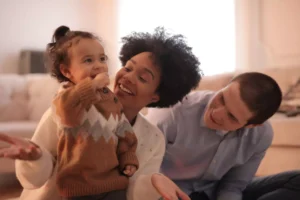Nolan had seemed to accept my point about living together being more like practice for divorce than like practice for marriage.
Then he asked, “But still. What if the two people get married, but turn out to be sexually incompatible? To prevent that catastrophe, wouldn’t you have to have sex first?”
“Nolan, Nolan, nobody is born with a particular style in bed.”
“No. When people chatter about sexual compatibility, what they mean is that the sexual habits that the woman picked up in sleeping with her previous men just happen to resemble the sexual habits that the man picked up in sleeping with his previous women. Wouldn’t it be more fun, and more exciting, to learn to make love just with each other, completely from scratch? Call it a eucatastrophe.”
“What’s that mean?”
I grinned. “It’s a term writers use. It means a happy ending.”
“Well — that may be happier in theory — but how is it even possible? I don’t know if you’ve noticed it, Prof, but we have these drives, you know. They have to be satisfied.”
“You speak as though they were slave masters. ‘Satisfy us!’ ‘Yes, yes, master, Igor hears you!’ Who’s in charge? Are your desires here to serve you, or are you here to serve them?”
Nolan looked at me in astonishment. “If you don’t mind my saying so, Professor Theophilus, you’re a lot older than I am. I think maybe you don’t remember just how strong these desires are in a guy.”
I smiled. “How would you know?”
“Okay. Let’s just say a man has strong desires.”
“If he isn’t in command of them, then he isn’t much of a man.”
“It’s fine to say that, but you can’t tell me it’s realistic.”
“It seems unrealistic to you because you don’t have a high enough view of your dignity as a grown-up rational being.”
“Hey, now!”
I smiled again. “Are you going to be offended that I think higher of you than you do?”
Nolan opened his mouth to say something, but changed his mind.
“It also seems unrealistic because you haven’t practiced the command of your appetites.”
“To quote you what you said, Prof — how would you know?”
“Because that’s what you’ve been telling me all along.”
“What?”
“If you say it can’t be practiced, then you couldn’t have been practicing it — could you?”
“But you’re not talking about ‘practice.’ You’re talking about magic. Me and a girlfriend are alone in her apartment. We’ve been making out on the sofa. And now, magically, we’re going to hit the brakes and not have sex?”
“Nolan, Nolan, use your common sense. Of course you’re likely to wind up in bed if you’ve been alone with your girlfriend in her apartment and you’ve been making out on the sofa. What follows?”
He paused before answering. “You want me to say that if I don’t want to wind up in bed, I shouldn’t be alone with her in her apartment making out on the sofa.”
“Is something wrong with that inference?”
“Well, no. But I don’t like it.”
I steepled my fingers. “We come now to the bottom of the matter.”
“About sex?”
“No, about marriage. Isn’t that what we were talking about? You said you were afraid that lifelong faithful marriage isn’t even possible. You asked what you could do to make it possible.”
“Oh. Yeah.”
“Have I done as you asked?”
“Well, you’ve said some stuff.”
“What stuff?”
“You said I have to actually mean my marriage vows. Not keep thinking there’s a back door, an exit. Also all that stuff about in sickness, in health, and all that. Very scary.”
“I didn’t say it was scary.”
“No, but it is. And you said I had to mean not only what the vows say, but what they imply. That stuff about complete and mutual self-giving. Even scarier. I think I’d want to hold onto part of myself.”
“Go on.”
“Be the kind of person so my wife can also be a better person. Her too, the other way around. Hard.”
“Yes.”
“Encourage other people to be faithful in their own marriages. Weird.”
“What else?”
“Prof, you’re wearing me out.”
“You’re doing fine.”
“Um. Be open to the gift of children, you said. They’re the fruit of love, and if you reject the fruit you’re rejecting, I guess, the tree. Really weird.”
“Why?”
“I thought love was just about the two people. You seemed to think that if it’s just about the two people, it isn’t even about the two people.”
I laughed. “Well put. Go on.”
“Become a good person. Practice the virtues.”
“Right.”
“Don’t live together before marriage. Don’t have sex apart from marriage. You said that stuff isn’t practice for marriage, but practice for divorce.”
“Right.”
“Is that everything?”
“Of course you’d have to marry someone who agrees with you about all this, Nolan.”
“I guess I would.”
“Do you want to hear more?”
He reflected. “No, I think I get the idea.”
“Then have I done as you asked?”
“Yes.”
“And have you stopped being afraid of marriage?” He didn’t answer.
I said, “You haven’t, have you?”
“No.”
“Why not? Because those things I said aren’t possible?”
“No. You convinced me about that. I see that they’re possible.”
“Because you don’t think they would build lifelong faithful marriage?”
“No. You’re probably right about that too.”
“Then why?”
He bit the corner of his mouth. “Because I don’t want to do them.”
“That’s why I said that we come now to the bottom of the matter.”
Pause. “Professor —”
“Still here.”
“Why don’t I want to do them?”
I looked at him steadily.
“You’re asking for my guess, Nolan? You want me to analyze your fear?”
“Yes. Not just mine. I’m not the only one afraid. It’s my whole generation. Why are we all afraid of marriage? Why do we all not want to do those things?”
I sighed. “Partly because my generation didn’t.”
“But yours did get married.”
“Many did what they called getting married. Far fewer of them did ‘those things.'”
“Mine sure didn’t.”
“It’s more than that, Nolan. The whole culture of marriage has been lost. A friend told me something her little boy said. Most of his friends’ parents are divorced. He said to her, ‘Mommy, when you and Daddy get divorced, I want to go with Daddy, because he takes me to ball games.'”
He winced. “So where does that leave us? You promised to analyze our fear.”
“That’s not really difficult. One motive for your fear of marriage is that you don’t believe marriage can work. That has to do with the fact that you’ve seen too many examples of unsuccessful marriage, all too often including your own parents.”
“But I know that already.”
“It’s also connected with the fact that from the point of view of preparing for a successful marriage, you’ve been doing all the wrong things. We didn’t teach you the right ones.”
He winced again. “That’s what we’ve been talking about.”
“Another motive for your fear of marriage is just plain fear of growing up. That has to do with the fact that you’ve seen too many examples of failure to grow up in my generation. All too often we weren’t even grown enough to stick around when you were small.”
He didn’t contradict me.
I said, “I think the second motive is also connected with the fact that we live in a wealthy, hedonistic, infantilizing culture.”
“What do you mean by ‘infantilizing’?”
“An infant wants everything right now. He can’t delay gratification. The culture encourages us to be adults at work — if even there — but infants in everything else.”
“I see that.”
“Those two motives for fear of marriage reinforce each other. If you don’t want to grow up, you’ve got a motive for believing that grown-up things like marriage are impossible. If you’ve been doing all the wrong things, you find it more difficult to grow up, and a motive to be afraid of even trying.”
Nolan nodded. “I think you’ve nailed it.”
“Not yet. There’s a third motive too.”
“What is it?”
“You’re afraid of marriage because you’re afraid of the grace of the God who created it.”
“But I’m not afraid of God.”
“Aren’t you? Don’t you remember how you posed your question?”
“What question?”
“The one we started with. You admitted that lifelong faithful marriage might be possible for ‘religious people’ who had what you called a ‘pipeline to that grace’ I was talking about. But you didn’t ask the question that obviously follows.”
He opened his eyes a little wider. “You mean how to tap into that pipeline.”
“Of course.”
“No,” he answered, “I didn’t. I asked whether lifelong faithful marriage is possible for someone like me. Someone who isn’t tapped in.”
For several seconds Nolan looked me straight in the eye. Then he turned away and gazed at the wall.
After a minute he cleared his throat and said, “I have to go now.” The tension broke like a pane of mirrored glass.
We moved to the door. I glanced at my watch. It was much later than I had thought.
“Six o’clock,” I murmured. “I’ve got 20 minutes to get home. My wife will be putting dinner on the table.”
In the hallway Nolan turned. “Do you and your wife always have dinner together?”
I smiled. “Always.”
He sighed. “That must be wonderful.”
Copyright 2010 J. Budziszewski. All rights reserved.











